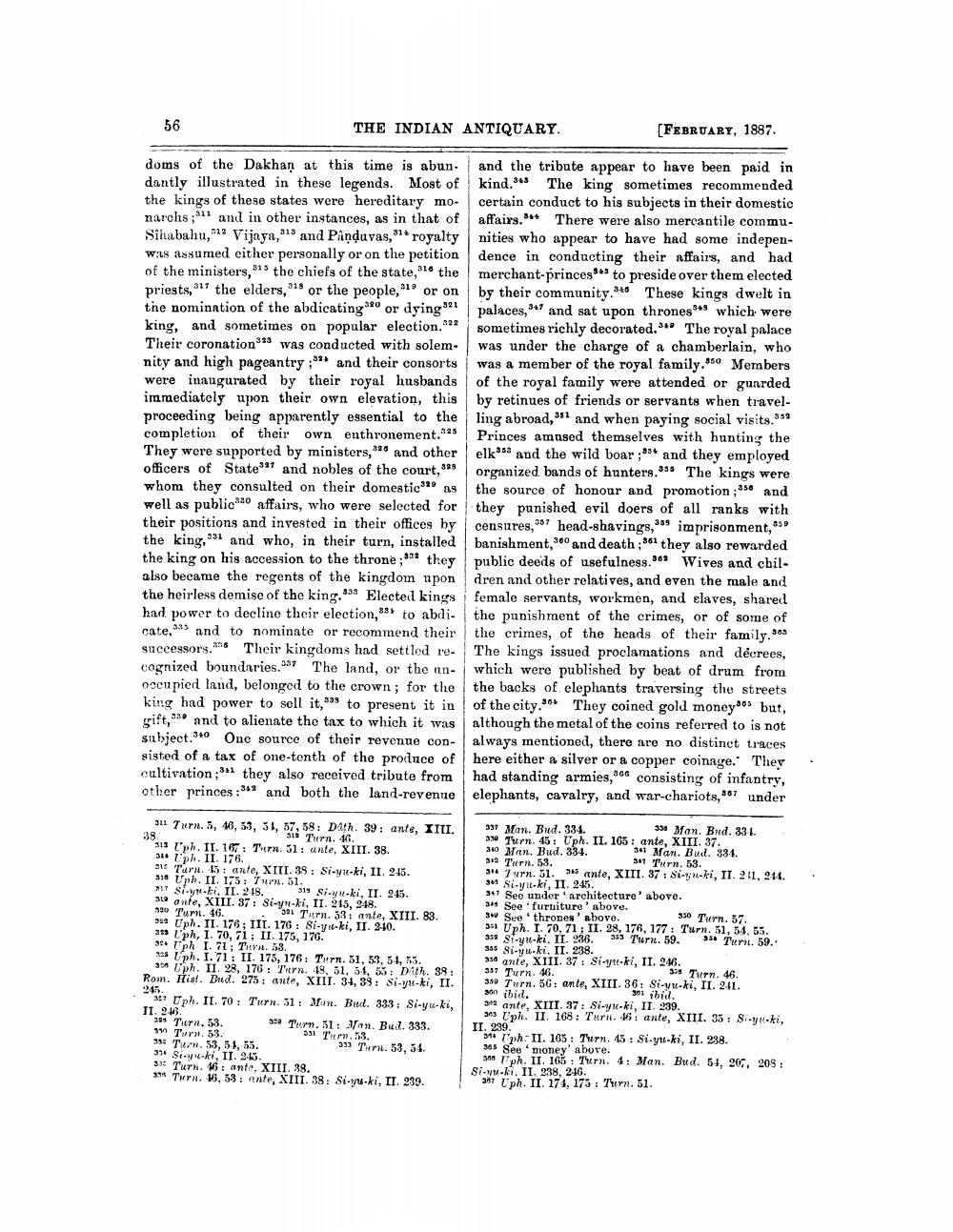________________
56
THE INDIAN ANTIQUARY.
FEBRUARY, 1887.
doms of the Dakhan at this time is abun and the tribute appear to have been paid in dantly illustrated in these legends. Most of kind." The king sometimes recommended the kings of these states were hereditary mo. certain conduct to his subjects in their domestic narchs ;$11 and in other instances, as in that of affairs. There were also mercantile commu. Sihabahu, ** Vijaya, 13 and Pânduvas, *** royalty nities who appear to have had some indepenwas assumed either personally or on the petition dence in conducting their affairs, and had of the ministers, 81s the chiefs of the state, the merchant-princes 945 to preside over them elected priests, the elders, 325 or the people, or on by their community. 346 These kings dwelt in the nomination of the abdicating or dying palaces, and sat upon thrones' which were king, and sometimes on popular election."22 | sometimes richly decorated. The royal palace Their coronation 923 was conducted with solem- was under the charge of a chamberlain, who nity and high pageantry; and their consorts was a member of the royal family.550 Members were inaugurated by their royal husbands of the royal family were attended or guarded immediately upon their own elevation, this by retinues of friends or servants when travelproceeding being apparently essential to the ling abroad, *1 and when paying social visits 352 completion of their own enthronement.125 Princes amused themselves with hunting the They were supported by ministers, 326 and other elk and the wild boar ;84 and they employed officers of States and nobles of the court, ** organized bands of hunters. The kings were whom they consulted on their domesticas the source of honour and promotion; and well as publicado affairs, who were selected for they punished evil doers of all ranks with their positions and invested in their offices by censures," head-shavings, *** imprisonment, 's! the king, 931 and who, in their turn, installed banishment, se and death ;961 they also rewarded the king on his accession to the throne ;" they public deeds of usefulness." Wives and chilalso became the regents of the kingdom upon dren and other relatives, and even the male and the heirless demise of the king. 139 Elected kings female servants, workmen, and claves, shared had power to decline their election, 83 to abdi- the punishment of the crimes, or of some of cate,*45 and to nominate or recommend their the crimes, of the heads of their family. 563 successors. *** Their kingdoms had settled re- The kings issued proclamations and decrees, cognized boundaries. The land, or the nn which were published by beat of dram from occupied land, belonged to the crown; for the the backs of elephants traversing the streets king had power to sell it, so to present it in of the city. They coined gold money's but, gift, and to alienate the tax to which it was although the metal of the coins referred to is not subject. $0 One source of their revenue con- always mentioned, there are no distinct traces sisted of a tax of one-tonth of the produce of here either a silver or a copper coinage. They cultivation ; 3+1 they also received tribute from had standing armies,ac consisting of infantry, other princes :and both the land-revenue elephants, cavalry, and war-chariots, 967 under
.
350 Turn. 57.
311 Turn. 5, 46, 53, 51, 57, 58: Dath. 39: ante, XIII. 38
313 Turn. 46. 313 lph. II. 167 : Tern. 51: ante, XIII. 38. 31. p. II. 176. 315 Tur 15: ante, XIII. 39: Si-yu-ki, II. 2-15. 318 Uph. II. 175: T . 51. 217 8 . , II.2 18. 319 Si-yu-ki, II. 245.
La ante, XIII. 37: Si-yn-ki, 11. 215, 248. 310 Turn. 46.
981 T R. 53: ante, XIII. 83. 9 Uph. II. 176; III. 176 : 8i-yu-ki, II. 210. 21 lph, I. 70, 71; II. 175, 176. 3. Tip I. 71; T . 53.
25 lph. 1.71: II. 175, 176: Thrn. 51, 53, 54, 5. 301 Uph. II. 28, 176 : Tern. 19, 51, 51, 55: DA. 89: Rom. Misl. Dud. 275: ante, XIII. 34,39 : Si yuki, II. 245
37 Uph. II. 70: Turn. 51: Jun. Bed. 333: Si-yu-ki, II. 26.
101 Turn. 53. 399 Turn. 51: Jan. B . 333. 5 Torn 53.
531 Turn... 335 T . 53, 51, 55.
333 Turn. 53, 34. 3Si-y -ki, II. 2-65. 334 Turn. 16 : ante. XIII. 38. 391 Tr. 15,53 : ante, XIII. 38: Si-yu-ki, II. 239. 1
337 Man. Bud. 334.
391 Man. Bred. 33 1. 310 Turn. 45: Uph. II. 165 : ante, XIII. 37. 240 Man. Bud. 334. 341 Man. Bud. 334. 313 Turn. 53.
31 Turn. 53. 34. Turn. 31. 365 ante, XIII. 37 : Si-yu-ki, II. 211, 214. 34 Si -ki, II. 245. 347 Seo under architecture above. 314 See furniture above. 30 See thrones' above. 31 Uph. I. 70, 71 ; II. 28, 176, 177: Turn. 51, 54, 55. 352 Si-yu-ki. II. 236. 353 Turn. 59. 35. Turn. 59. 355 8i-wa-ki. II. 238. 358 ante, XIII. 37: Si-yte-ki, II. 246. 357 Turn. 46.
38 Turn. 46. 380 Turn. 50: ante, XIII. 36: Si-yu-ki, II. 241. 300 ibid.
301 ibid. 349 ante, XIII. 37: Si-yu-ki, IL 239.
313 'ph. II. 168: Turn. 46: ante, XIII. 35: S-yu-ki, II. 239
34 pn: II. 165 : Turn. 45 : Si-yu-ki, II. 238. 365 See money' abore.
son iph. II. 166 Turn. 4: Man. Bud. 51, 207, 208 : Si-yu-kl. II. 238, 246. 367 Uph. II. 174, 175 : Turn. 51.




